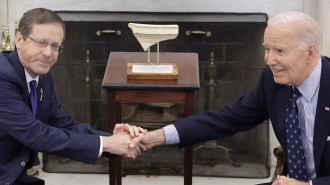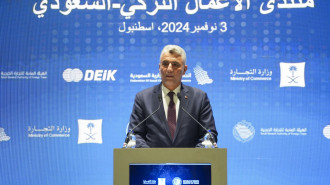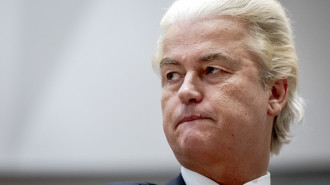Jordan takes in sick Syrian child after support campaign
Jordan has allowed a sick Syrian child to enter the country from a border area where thousands of refugees are stranded, the army said on Wednesday.
The decision followed a support campaign after a video of the boy crying with a severely inflamed testicle was posted online last week.
Social media users showed sympathy and support by launching the Arabic-language hashtag "Let the Rukban child in".
In a statement, the army thanked "all those who helped to relay the image of the sick child in order to treat him".
Twitter Post
|
Translation: Either let the child in or allow a medical team to rescue him. This is like a person dying of thirst near a water well.
Twitter Post
|
The child and his family are among tens of thousands of Syrians who are stranded near the Rukban border crossing in the northeast of the kingdom.
Jordan declared the area a "closed military zone" in June, after a suicide bombing claimed by the Islamic State (IS) group killed seven soldiers near a makeshift desert camp where more than 100,000 Syrians are stranded.
This cut off aid access to the Syrians, who have been gathering at the border for months attempting to flee their country's five-year civil.
Jordan says it is already hosting nearly 1.4 million refugees, of whom 630,000 are registered with the United Nations.
Aid agencies have pleaded with the government to restore access to the camp, and earlier this month, Jordan allowed a delivery of desperately needed food and hygiene supplies after an appeal by the United Nations.
However, Jordan's King Abdullah II has recently rejected calls to restore the refugees' access to the border area.
In comments published by the semi-governmental Addustour newspaper on Monday, the king cited fears of "extremist elements" among those stranded, many of whom come from areas controlled by IS.
"Despite all difficulties, Jordan is doing its utmost to help refugees," he said, "but that will under no circumstances be at the expense of the livelihood of Jordanians and their security."
"This is an international crisis and an international responsibility and the world has to do its part."
![Syrian refugees in Jordan [AFP] Syrian refugees in Jordan [AFP]](/sites/default/files/styles/large_16_9/public/media/images/0B2BD770-F4AC-4E6C-A64B-4F91C2C5717C.jpg?h=d1cb525d&itok=qo0PuZZC)






 Follow the Middle East's top stories in English at The New Arab on Google News
Follow the Middle East's top stories in English at The New Arab on Google News


